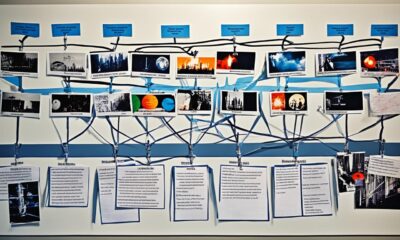Understanding Narcissism
10 Signs of a Narcissist's Deceptive Lies

Recognize a narcissist's deceptive lies by watching for exaggerated accomplishments, blaming others, lack of empathy, gaslighting tactics, and a grandiose self-image. Shifting blame, false promises, playing the victim, and twisting the truth are common manipulation strategies. Understanding these signs is important in protecting oneself from deceit. Learn to identify these behaviors to shield against manipulation and maintain personal boundaries.
Key Takeaways
- Exaggerated accomplishments to create false image.
- Blaming others to avoid responsibility.
- Lack of genuine empathy, faking concern.
- Gaslighting tactics to manipulate and confuse.
- Grandiose self-image with deceptive facade.
Exaggerated Accomplishments
Exaggerating accomplishments is a common tactic used by narcissists to inflate their image and manipulate others into believing they're more successful than they truly are. These individuals are skilled at weaving deceptive lies, often going to great lengths to fabricate stories that paint them in a favorable light.
By exaggerating their accomplishments, narcissists seek to manipulate those around them, creating a false sense of superiority and garnering admiration and validation. The tales they spin can vary from minor embellishments to elaborate fabrications, all aimed at controlling the perceptions others have of them.
Uncovering the truth behind a narcissist's exaggerated accomplishments reveals a pattern of manipulation and deceit that underpins their behavior. It's essential to remain vigilant and discerning when faced with individuals who consistently exaggerate their achievements, as this behavior is a hallmark of narcissism and can lead to further manipulation and harm.
Blaming Others

When a narcissist shifts blame onto others, it's often a tactic to avoid taking responsibility for their own actions.
This behavior can be harmful, leading to emotional manipulation and gaslighting.
Recognizing these patterns is essential in protecting ourselves from further harm.
Shifting Blame Tactics
Narcissists frequently employ the tactic of shifting blame onto others as a means to evade accountability for their actions or mistakes. This manipulation tactic is a tool for them to maintain control and deceive those around them. By deflecting responsibility onto innocent parties, narcissists create a false narrative that protects their self-image. Below is a table outlining how blame shifting is intertwined with manipulation, control, deception, and responsibility:
| Manipulation | Control | Deception | Responsibility | Blame Shifting |
|---|---|---|---|---|
| Twisting facts | Dictating | Lying | Owning up | Faulting others |
| Gaslighting | Micromanaging | Covering up | Being honest | Accusing innocents |
| Guilt-tripping | Isolating | Fabricating | Facing consequences | Passing blame |
Recognizing these signs is essential in breaking free from the cycle of control and deception.
Denying Responsibility Outright
Shifting blame onto others is an important tactic used by narcissists to avoid taking responsibility for their actions, and this behavior often escalates to outright denial and blaming others for their wrongdoings. By refusing to acknowledge their role in negative situations, narcissists shift accountability onto external factors, creating a distorted reality where they're faultless.
This manipulative tactic allows them to evade consequences, maintain a facade of innocence, and continue their deceptive behaviors unchecked. Recognizing this pattern of denying responsibility and blaming others is vital in identifying a narcissist's deceptive lies and protecting oneself from their harmful tactics.
Stay vigilant and trust your instincts when someone consistently shifts blame onto others, as it may be a red flag for deeper manipulative tendencies.
Lack of Empathy

Understanding the absence of genuine empathy in individuals with narcissistic traits is essential in identifying their deceptive behavior. Narcissists lack empathy, which allows them to deceive and manipulate others without feeling guilt or remorse. Their shallow empathy enables them to lie convincingly, prioritizing their own needs over the well-being of others.
This lack of empathy means they can fake concern to deceive their victims, but it's often insincere. By recognizing this lack of empathy, individuals can protect themselves from falling prey to narcissists' deceptive lies. It's important to be aware of this trait as it serves as a red flag for spotting manipulative behavior.
Keep in mind that narcissists may use their apparent charm to mask their lack of genuine empathy, so it's essential to remain vigilant and trust your instincts when interacting with individuals who exhibit signs of shallow empathy.
Gaslighting Tactics

Gaslighting tactics distort reality and manipulate victims into doubting their own perceptions and sanity. Narcissists use this insidious strategy to maintain control and power over their victims by denying facts, belittling concerns, and shifting blame onto the victim. This manipulation can lead to confusion, self-doubt, and emotional distress in victims as they question their reality and memories. Victims often feel isolated, anxious, and invalidated as the narcissist systematically undermines their confidence and sense of reality.
Recognizing gaslighting tactics is essential for victims to break free from the narcissist's deception. By understanding these manipulative techniques, individuals can regain their mental clarity and self-trust. It's vital to trust your instincts, seek support from trusted individuals, and document instances of gaslighting for validation.
Grandiose Self-Image

Our discussion on the grandiose self-image of a narcissist sheds light on their tendency to inflate their achievements and skills.
This behavior stems from a deep-rooted desire to maintain a facade of superiority and uniqueness.
Exaggerated Achievements
Highlighting achievements is a common tactic used by narcissists to inflate their self-importance and manipulate others. When encountering individuals who engage in this behavior, it's crucial to be aware of the signs.
Here are three key indicators to watch out for:
- Over-the-Top Stories: Narcissists may fabricate elaborate tales of success or accomplishments to bolster their grandiose self-image.
- Unverifiable Achievements: They might boast about feats that are difficult or impossible to verify, seeking admiration and validation from others.
- Discrepancies in Stories: Inconsistencies in their narratives or an excessive focus on their achievements could indicate a need for attention and admiration rather than a genuine reflection of reality.
Being mindful of these signs can help you navigate interactions with individuals who resort to exaggerated achievements to maintain their deceptive facade.
Unrealistic Self-Perception
When encountering individuals who exhibit exaggerated achievements, it becomes evident that their unrealistic self-perception, characterized by a grandiose self-image, plays a significant role in their deceptive behavior.
Narcissists often believe they're superior to others, leading them to fabricate stories and accomplishments to maintain this facade. Their inflated sense of self-importance drives them to manipulate and deceive others, seeking constant validation and admiration.
This grandiose self-image may not align with reality, yet they continue to boast and exaggerate their abilities to uphold their perceived superiority.
Manipulative Behavior

Manipulative behavior displayed by narcissists encompasses a range of tactics aimed at deceiving and controlling others. These manipulation tactics include gaslighting, projection, and love bombing. Here are three key aspects of manipulative behavior employed by narcissists:
- Gaslighting: This insidious tactic involves distorting the truth, making the victim doubt their own perceptions and memories. By invalidating the victim's reality, narcissists gain power and control over them.
- Projection: Narcissists often project their own negative traits onto others, deflecting attention away from their own flaws and insecurities. This manipulation tactic can confuse and disorient the victim, making it easier for the narcissist to maintain their deceptive facade.
- Emotional Manipulation: Through manipulation of emotions, narcissists exploit their victims for personal gain. They use emotional blackmail, guilt-tripping, and other tactics to control and manipulate others, all while hiding behind a mask of charm and charisma. Understanding these manipulation tactics can help individuals recognize and protect themselves from the deceptive lies of narcissists.
Shifting Blame

When a narcissist shifts blame onto others, they're avoiding responsibility for their actions and trying to maintain a flawless image.
They twist facts, distort reality, and manipulate situations to make themselves seem faultless.
Blaming others for their mistakes allows them to continue their deceitful behavior and evade consequences.
Dodging Responsibility Tactics
In shifting blame onto others, narcissists cunningly avoid taking responsibility for their actions and safeguard their self-image. Here are three common tactics they use to dodge responsibility:
- Denial: Narcissists often flat out deny any wrongdoing, refusing to acknowledge their part in a situation.
- Deflection: They skillfully redirect attention away from their actions by pointing fingers at others or bringing up unrelated issues.
- Projection: By projecting their faults onto others, narcissists twist reality to make themselves appear blameless while painting others as the ones at fault.
Recognizing these dodging responsibility tactics is key to understanding the manipulative behavior of narcissists and seeing through their deceptive facade.
Deflecting Accountability for Actions
Shifting blame onto others is a common tactic narcissists use to deflect accountability for their actions. By doing so, they avoid taking responsibility for their mistakes or wrongdoings. This manipulation tactic involves deceiving others and creating confusion through gaslighting.
Narcissists refuse to face consequences by deflecting accountability onto external factors or individuals, maintaining a false image of perfection and control. Through this deceptive behavior, they perpetuate a cycle of lies and manipulation to evade being held responsible for their actions.
Recognizing these signs of deflecting accountability is crucial in identifying manipulation and deception by narcissists. It's important to remain vigilant and assertive in holding individuals accountable for their actions to prevent falling victim to their tactics.
Blaming Others for Mistakes
Understanding how narcissists blame others for their mistakes reveals their manipulative tactics and evasive behavior.
Blaming others is a way for narcissists to avoid facing their own shortcomings and flaws.
This manipulation tactic allows them to maintain a facade of perfection and superiority.
By shifting blame onto others, narcissists can escape accountability and consequences for their actions.
It's important to recognize this pattern of blaming others as it exposes the deceptive lies and manipulation commonly employed by narcissists.
Being aware of these behaviors can help protect oneself from falling victim to their schemes and maintain a sense of freedom and autonomy in relationships.
False Promises

Narcissists ensnare their victims with grandiose false promises, manipulating emotions and wielding control with deceptive allure. These individuals excel at using false promises to lure others into their web of manipulation and control. By offering declarations of love, loyalty, and unwavering support, they captivate their victims, only to let them down when it matters most.
The empty words serve as a means for narcissists to maintain their hold over others, keeping them trapped in a cycle of broken assurances and shattered dreams. Victims of these false promises often find themselves grappling with feelings of disappointment, betrayal, and emotional manipulation, as the narcissist's deceit unravels before their eyes.
It's important to recognize the signs of these deceptive tactics and break free from the toxic grip of false promises. Remember, true empowerment comes from seeing through the facade of deception and reclaiming control over your own life.
Playing the Victim

Entering the domain of manipulation, victims often encounter a cunning tactic employed by narcissists – playing the victim. This deceptive behavior is a tool for them to maintain control and avoid taking accountability for their actions. Here are three key points to ponder upon:
- Manipulation: Narcissists use playing the victim as a manipulative strategy to elicit sympathy and emotional reactions from others. By portraying themselves as innocent and wronged, they seek to gain power over those around them.
- Avoiding Accountability: When narcissists play the victim, they deflect responsibility for their behaviors and choices. This tactic allows them to shift blame onto others and escape facing the consequences of their actions.
- Maintaining Control: By positioning themselves as victims, narcissists aim to control the narrative and manipulate the perceptions of those around them. This control enables them to continue their deceptive lies and exert influence over relationships. Recognizing this behavior can help individuals see through the facade and protect themselves from manipulation.
Twisting the Truth

Twisting facts, distorting realities, and manipulating narratives are common tactics employed by narcissists in their deceptive web of lies. When narcissists engage in twisting the truth, they aim to control how others perceive situations by distorting facts and omitting essential details.
This manipulation tactic allows them to craft a narrative that portrays them favorably while shifting blame onto others for any negative outcomes. By using half-truths and selective memory, narcissists mislead those around them and maintain a grip on the narrative.
The insidious nature of twisting the truth can lead to gaslighting, where victims of narcissistic deception may struggle to trust their own perceptions. The constant manipulation of facts by narcissists can create a sense of confusion and doubt in those targeted by their deceptive lies.
Recognizing this form of deceit is vital in breaking free from the web of manipulation woven by narcissists.
Frequently Asked Questions
How Does a Narcissist Act When Caught in a Lie?
When caught in a lie, we narcissists may exhibit various defensive behaviors. This can include deflecting blame, gaslighting to manipulate the truth, or crafting more elaborate lies to cover up the initial falsehood. Some of us may resort to denial, projection, or engaging in victim-playing as a means to avoid taking accountability for our actions. Remorse or guilt for deceiving others is often lacking in individuals with narcissistic tendencies. In many cases, instead of admitting the lie, we may choose to double down on the false narrative as a way to maintain control and power.
How Do You Tell if a Narcissist Is Lying to You?
When dealing with a narcissist, watch for inconsistencies in their stories, excessive exaggerations, and frequent changes in what they say. Look out for charm, flattery, and manipulation to cover up lies and maintain a positive image. Non-verbal cues like avoiding eye contact, fidgeting, or appearing nervous can signal dishonesty.
Gaslighting tactics, where they deny reality or make you doubt your memory, are also red flags. Trust your instincts and observe behavior patterns to spot deceitful behavior.
What Words Can Destroy a Narcissist?
When dealing with a narcissist, certain words can deeply affect them. Challenging their facade can trigger explosive reactions. Criticism or confrontation may lead to defensive tactics. Doubting their claims might provoke insecurity and defensiveness. Exposing their lies can result in aggressive retaliation.
These actions can shatter the false image they hold dear and make them feel vulnerable. It's important to approach such situations with caution and self-awareness.
How Do You Catch a Narcissist in a Lie in Court?
To catch a narcissist in a lie in court, we suggest looking for inconsistencies. Observing body language cues like lack of eye contact is another important tactic. Gathering corroborating evidence or witnesses can also be helpful in this situation. Consulting legal experts for advice and guidance is crucial. Additionally, using technology such as surveillance footage can be instrumental in discrediting false claims. By following these steps, you can increase your chances of exposing the narcissist's deception and presenting a stronger case in court.
Conclusion
To sum up, being able to identify the signs of a narcissist's deceptive lies is essential for safeguarding ourselves from manipulation and harm. By remaining vigilant and being mindful of their tactics, we can navigate challenging situations with clarity and confidence.
Just as a lighthouse guides ships safely through turbulent waters, understanding these warning signs can help us steer clear of the treacherous seas of deceit.
Stay informed, stay alert, and stay empowered in the face of deception.
Covert Narcissist
What Makes a Covert Narcissist Different from an Avoidant?
Analyze the intricate behaviors of a covert narcissist or avoidant individual, unraveling the fine line between self-absorption and emotional distance.

The saying ‘actions speak louder than words’ is particularly relevant when differentiating between a covert narcissist and someone with avoidant tendencies within the realm of character traits. The specific behaviors exhibited by individuals with these personality types often cause uncertainty regarding their true motivations and intricate emotions.
As we navigate through the intricate web of characteristics and relational patterns associated with these traits, a deeper understanding of the driving forces behind each persona unveils a fascinating journey into the complexities of human behavior.
Key Takeaways
- Covert narcissists manipulate through gaslighting, lack empathy, and have fragile self-esteem.
- Avoidant individuals fear rejection, struggle with intimacy, and have difficulty expressing emotions.
- Differentiate between covert narcissists and avoidant individuals to navigate relationships effectively.
- Setting boundaries and practicing self-care are crucial in managing interactions with these individuals.
Understanding Covert Narcissistic Behaviors
In understanding covert narcissistic behaviors, it's crucial to recognize the subtle manipulation tactics employed by individuals who exhibit this personality trait. Covert narcissists often display an avoidant attachment style characterized by a strong need for admiration and a lack of empathy towards others. This attachment style stems from underlying feelings of inadequacy and a fragile self-esteem, leading them to seek validation through controlling and manipulating others.
Individuals with covert narcissism may use tactics such as gaslighting, where they distort reality to make their victims doubt their own perceptions and memories. By eroding their victim's sense of reality, covert narcissists gain power and control over them. This manipulation is a key feature of their narcissistic behavior, allowing them to maintain a facade of superiority and self-importance.
Understanding the interplay between avoidant attachment styles and narcissism is crucial in identifying and dealing with covert narcissistic behaviors. By recognizing these subtle manipulation tactics, individuals can better protect themselves from falling victim to the harmful effects of covert narcissists.
Signs of Avoidant Personality Traits

Having understood the manipulation tactics of covert narcissists, it's imperative to recognize the signs of avoidant personality traits that often accompany such behaviors. Avoidant individuals may exhibit the following characteristics:
- Avoidance of intimacy and emotional closeness in relationships.
- Fear of rejection and low self-esteem leading to social withdrawal.
- Difficulty expressing emotions and reluctance to seek help or support.
- Preferring solitary activities and avoiding social interactions.
These traits can stem from various factors, including childhood attachment patterns. Individuals with avoidant attachment styles may struggle with forming secure emotional connections due to past experiences. This can lead to a tendency to withdraw from relationships to protect themselves from perceived rejection or vulnerability.
Understanding these signs can help differentiate between covert narcissistic behaviors and avoidant personality traits, shedding light on the complexities of interpersonal dynamics. Furthermore, recognizing these patterns can aid in addressing underlying issues and fostering healthier relationships.
Impact on Relationships
The impact of avoidant personality traits on relationships can manifest in various ways, affecting both individuals involved. Avoidant individuals often struggle with forming secure attachments, which can lead to challenges in establishing and maintaining healthy adult relationships. Let's delve into the specific impacts on relationships through the table below:
| Impact on Relationships | Description |
|---|---|
| Difficulty with Intimacy | Avoidants may have difficulty opening up emotionally, leading to a lack of intimacy in relationships. |
| Fear of Rejection | Due to their fear of rejection, avoidant individuals may push partners away or avoid commitment altogether. |
| Communication Issues | Avoidants often struggle with effective communication, leading to misunderstandings and conflicts in relationships. |
Understanding these impacts is crucial in navigating relationships with individuals exhibiting avoidant traits. It's important to differentiate between avoidant behaviors and narcissistic personality disorder, as the underlying motivations and dynamics in relationships can vary significantly.
Differentiating Covert Narcissists and Avoidant Individuals

Upon examining the distinct characteristics of covert narcissists and avoidant individuals in relationships, it becomes evident that their behaviors and underlying motivations diverge significantly. When differentiating between covert narcissists and avoidant individuals, several key points emerge:
- Covert narcissists excel at masking their true intentions, seeking admiration and control, while avoidant individuals are more inclined to shun intimacy due to fear of rejection.
- Covert narcissists often employ false humility to garner trust and sympathy, whereas avoidant individuals may struggle with self-esteem and play down their accomplishments.
- Covert narcissists actively seek attention and manipulate situations to be the center of focus, while avoidant individuals prefer to evade attention and remain in the background.
- Covert narcissism is characterized by an unquenchable thirst for admiration and a tendency towards manipulation, whereas avoidant individuals harbor a deep-rooted dread of rejection and encounter difficulties in establishing intimate connections.
Understanding these distinctions can aid in recognizing and navigating relationships with individuals who exhibit traits of either covert narcissism or avoidance.
Coping Strategies and Setting Boundaries
To effectively navigate relationships with individuals displaying traits of covert narcissism or avoidance, implementing and maintaining clear boundaries is essential. When dealing with covert narcissists or avoidant individuals, establishing boundaries helps protect against manipulation and emotional harm.
It's crucial to clearly communicate your limits and expectations to maintain a healthy dynamic. Additionally, practicing coping strategies such as self-care, assertiveness, and seeking support from trusted individuals like friends, family, or therapists can aid in managing interactions with these personality types.
Prioritizing self-care activities that bring joy and fulfillment can help in maintaining emotional well-being. Learning to assertively express needs and feelings without fear of manipulation is key in setting boundaries with covert narcissists or avoidant individuals.
Limiting contact with these individuals when possible can also safeguard emotional health and reinforce boundaries. By incorporating these coping strategies and setting clear boundaries, one can navigate relationships with covert narcissists or avoidant individuals more effectively.
Frequently Asked Questions
Am I Avoidant or Narcissist?
We often question our behavior and tendencies, wondering if we fall into certain psychological categories. It's natural to reflect on our actions and personalities, seeking to understand ourselves better.
Identifying whether we exhibit avoidant or narcissistic traits can provide insight into our emotional patterns and relationships. Self-awareness is a key step in personal growth and development, allowing us to address areas where we may need to make positive changes.
What Can Be Mistaken for Covert Narcissism?
When examining behaviors that can be confused with covert narcissism, it's crucial to consider traits like introversion, shyness, or social anxiety. These characteristics may manifest similarly to covert narcissistic tendencies, such as avoiding social interactions or seeking validation through subtle means.
Understanding the nuances between these traits is essential in accurately identifying covert narcissism and differentiating it from other personality traits or disorders.
What Are the Red Flags of a Covert Narcissist?
When assessing potential red flags of covert narcissism, observing patterns of behavior is crucial. Look for signs of manipulation, lack of empathy, grandiosity, and a constant need for admiration.
Pay attention to how they interact with others, especially in social settings or when faced with criticism. Keep an eye out for subtle but persistent displays of entitlement and a tendency to exploit others for personal gain.
These behaviors can indicate underlying narcissistic traits.
What Hurts a Covert Narcissist the Most?
Criticism or rejection can deeply wound individuals who seek external validation, control, and admiration.
Failure to manipulate or threats to their grandiose fantasies can also trigger intense hurt.
Such individuals may struggle with feelings of inferiority, invisibility, and a fragile self-image.
Understanding these vulnerabilities can shed light on what truly affects them at their core.
Is the Behavior of a Covert Narcissist Related to Their Constant Illness?
The covert narcissist’s constant sickness may be a manipulation tactic to garner sympathy and attention. By portraying themselves as perpetually unwell, they seek to control others’ perceptions and elicit constant care and attention. This behavior aligns with their need for admiration and validation, perpetuating their narcissistic traits.
Conclusion
In conclusion, navigating relationships with individuals exhibiting covert narcissistic behaviors or avoidant attachment can be challenging. It's like walking a tightrope, balancing between their need for validation and fear of intimacy.
Setting boundaries and practicing self-care are crucial in maintaining healthy interactions with these personality types. Remember, understanding their underlying motivations can help in managing expectations and protecting your emotional well-being.
Chris brings a wealth of knowledge and personal experience to the role of Expert Author. With a focus on narcissistic personality disorder and recovery processes, Chris’s articles offer a mix of expert analysis, personal anecdotes, and actionable advice. Their work enriches our platform with depth, authenticity, and a perspective that resonates with those who have experienced narcissism firsthand.
Narcissism Test
Discover Your Inner Narcissist: You Quiz
Intrigued to uncover hidden traits? Take the 'How Narcissist Are You Quiz' and delve into the spectrum of narcissistic tendencies.

Have you ever thought about how self-awareness can shed light on different aspects of our personalities in our everyday interactions? Do you ever wonder how your level of self-reflection compares to that of others?
The 'How Narcissist Are You Quiz' unveils a spectrum of narcissistic tendencies that might surprise you. Let's explore how this quiz can offer a glimpse into our psyche and potentially challenge our perceptions of self-image.
Key Takeaways
- Online quizzes are not diagnostic tools for narcissistic personality disorder.
- Self-reflection allows introspection and analysis of actions, thoughts, and emotions.
- Analyzing conduct provides valuable insights and fosters healthier relationships.
- Seek guidance from mental health professionals for understanding and addressing tendencies.
Understanding Narcissism Through a Quiz
Exploring narcissism through a quiz can provide insights into the traits associated with narcissistic personality disorder. Narcissistic traits such as grandiosity, lack of empathy, and manipulation are often fundamental aspects of this disorder. By engaging with a narcissism quiz, individuals may gain a better understanding of these characteristics and how they manifest in their own behavior.
While such quizzes can serve as a preliminary screening tool, it's essential to recognize their limitations. Online quizzes aren't diagnostic tools and shouldn't be solely relied upon for a definitive diagnosis of narcissistic personality disorder. Instead, they can prompt individuals to reflect on their behaviors and seek further evaluation from mental health professionals if necessary.
To truly comprehend the complexities of narcissistic personality disorder, one must undergo a comprehensive assessment by a qualified specialist. Seeking professional help is crucial for an accurate diagnosis and the development of an appropriate treatment plan tailored to the individual's specific needs and circumstances.
Self-Reflection on Narcissistic Behaviors

After considering the limitations of online quizzes in diagnosing narcissistic personality disorder, it becomes imperative to engage in self-reflection on our own behaviors that may align with narcissistic traits. Self-reflection allows us to introspect and analyze our actions, thoughts, and emotions for signs of narcissistic tendencies. To aid in this process, a structured approach can be helpful. The table below outlines key behaviors associated with narcissistic personality disorder for self-assessment:
| Narcissistic Behavior | Description | Self-Reflection |
|---|---|---|
| Grandiosity | Exaggerated sense of self-importance | Have I displayed an inflated ego? |
| Lack of Empathy | Difficulty understanding others' feelings | Have I been insensitive to others' emotions? |
| Need for Admiration | Constant seeking of praise and admiration | Do I constantly seek validation from others? |
| Sense of Entitlement | Belief in special treatment and privileges | Have I expected special treatment in situations? |
Analyzing our conduct through this lens can provide valuable insights into our personalities and help in fostering healthier relationships.
Exploring Narcissistic Tendencies Together
Together, we'll delve into the manifestations of narcissistic tendencies within interpersonal relationships to enhance our understanding and foster a supportive environment for growth.
When exploring narcissistic behaviors in relationships, it's crucial to distinguish between normal self-interest and the traits associated with Narcissistic Personality Disorder (NPD). Individuals with NPD often exhibit a grandiose sense of self-importance, a constant need for admiration, and a lack of empathy for others. These characteristics can significantly impact how they interact with those around them, leading to strained relationships and emotional distress for both parties involved.
In today's digital age, social media platforms can amplify narcissistic tendencies, providing individuals with NPD a stage to seek validation and attention on a broader scale. The instant gratification and validation received through likes, comments, and followers can fuel their narcissistic traits, reinforcing their belief in their superiority and entitlement.
Assessing Your Narcissistic Traits

Within interpersonal relationships, understanding and recognizing one's narcissistic traits is essential for fostering personal growth and maintaining healthy dynamics. When assessing your narcissistic tendencies, it's crucial to approach the evaluation with a reflective and open mindset. Here are some key points to consider:
- Causes of Narcissistic Personality: Delve into the root causes that may have contributed to the development of narcissistic traits, such as childhood experiences or past relationships.
- Consulting a Mental Health Professional: Seeking guidance from a mental health professional can provide valuable insights and support in understanding and addressing narcissistic tendencies.
- Inflated Sense of Self-Importance: Reflect on instances where you may have exhibited an inflated sense of self-importance or a constant need for admiration from others.
- Impact on Interpersonal Relationships: Evaluate how your narcissistic traits impact your relationships with others and consider the feedback you receive from those around you.
- Self-Reflection and Growth: Engage in self-reflection to identify areas for personal growth and work towards cultivating healthier relationship dynamics.
Insights Into Your Personality: The Narcissism Quiz
The Narcissism Quiz provides a structured assessment tool to evaluate narcissistic behaviors and offer insights into one's personality. By answering a series of multiple-choice questions that reflect narcissistic tendencies, individuals can gain a better understanding of their own behavior patterns.
This quiz isn't a diagnostic tool for Narcissistic Personality Disorder (NPD) but can help determine whether certain traits align with narcissistic characteristics inspired by Greek mythology.
The results of the quiz are anonymous, allowing participants to reflect on their responses without fear of judgment. It's essential to approach the findings with an open mind and consider seeking guidance from a mental health professional if concerns about narcissistic traits arise.
Frequently Asked Questions
How Do You Check if You Are a Narcissist?
We assess narcissistic tendencies by reflecting on our behaviors, thoughts, and interactions with others. Observing how we prioritize our own needs over those of others, seek excessive admiration, or lack empathy can provide insights.
Engaging in self-reflection, seeking feedback from trusted individuals, and considering professional evaluation are valuable steps in evaluating potential narcissistic traits.
Awareness and willingness to address these aspects can be crucial for personal growth and healthier relationships.
What Is the One Question to Identify a Narcissist?
We can identify a potential narcissist by asking if they believe they're more special or unique than others. A resounding 'yes' to this question may indicate narcissistic tendencies.
It's important to distinguish between healthy self-esteem and exaggerated self-importance. However, this question alone isn't a definitive diagnosis of narcissistic personality disorder.
Seeking a professional evaluation from a mental health expert is crucial for an accurate assessment.
What Words Can Destroy a Narcissist?
We've explored how criticism, rejection, ignoring, accountability, and empathy can deeply affect a narcissist. These words have the power to pierce through their facade of superiority and self-centeredness, challenging their fragile ego and sense of self-worth. Understanding these triggers can help us navigate interactions with narcissistic individuals more effectively, promoting healthier relationships and boundaries.
It's crucial to approach such situations with empathy and caution, recognizing the complexities at play.
Can a Narcissist Cry Easily?
Yes, narcissists can cry, but it's typically not genuine. Their tears often serve a manipulative purpose, such as to elicit sympathy or control others. When they do cry, it's usually driven by self-pity or to further their own agenda.
These emotional displays are short-lived and quickly revert back to their self-centered focus.
It's essential to recognize that not all individuals who cry easily exhibit narcissistic traits, as crying is a normal and healthy response.
Conclusion
In conclusion, taking the 'How Narcissist Are You Quiz' can provide valuable insights into your level of narcissism.
It's important to remember that self-awareness is key to personal growth and building healthy relationships.
Just like a mirror reflecting our inner selves, this quiz serves as a tool to help us understand and address our behaviors.
Remember, seeking professional help is always recommended for accurate diagnosis and treatment.
Our Content Strategist, Jordan, has a knack for deciphering the digital landscape to determine what our audience seeks. With a foundation in behavioral science and digital marketing, Jordan crafts our content strategy, ensuring that our topics are relevant, research-based, and resonant. Their strategic approach helps Narcissistic Man reach hearts and minds across the globe.
Covert Narcissist
Unveiling the Covert Narcissist’s Final Discard Tactics
Beware the covert narcissist's final discard – uncover the unsettling aftermath and psychological implications that linger long after.

It might be surprising, but studies show that nearly 20% of individuals could encounter a covert narcissist during their lifetime.
The covert narcissist's final discard is a complex and often painful experience that can leave lasting emotional scars. Understanding the intricacies of this behavior can offer insight into the manipulation and psychological impact it can have on those involved.
Exploring the warning signs and aftermath of such a discard can shed light on the dynamics at play and provide a path to healing and recovery.
Key Takeaways
- Gradual withdrawal and manipulation are warning signs of covert narcissist discard.
- Emotional devastation and questioning of reality are common after covert narcissist discard.
- Focus on self-care, therapy, and setting boundaries for coping after covert narcissist discard.
- Seek professional help and surround yourself with a supportive network for healing from covert narcissist abandonment.
Warning Signs of Covert Narcissist Discard
During the discard phase, covert narcissists often gradually withdraw, decrease communication, and engage in subtle manipulative behaviors to undermine the victim's confidence.
Signs of a subtle covert narcissist discard can include setting unclear boundaries, invading personal space, and withholding emotional support.
As the fragile self-esteem of the victim becomes apparent, the covert narcissist may use manipulation tactics such as deflecting blame onto the victim. They may leave you feeling isolated and confused as the narcissist decides when to provide affection and when to withdraw it.
It's essential to recognize these warning signs early on to protect oneself from further emotional harm. By establishing and enforcing personal boundaries, individuals can begin to mitigate the damaging effects of a covert narcissist's discard phase.
Understanding these manipulation tactics is crucial in breaking free from the cycle of emotional abuse perpetuated by covert narcissists.
Emotional Impact of Final Discard

The emotional aftermath of being finally discarded by a covert narcissist can be overwhelmingly devastating, leaving individuals shattered and questioning their self-worth.
Covert narcissists wield power and control in relationships, manipulating emotions to serve their needs.
The discard phase is emotionally draining, as the partner realizes they were merely an object of attention that can be easily cast aside. This act of abandonment can shatter established boundaries, leaving the individual feeling used and disposable.
The covert narcissist's ability to manipulate your emotions can leave you feeling emotionally unstable and questioning your own reality.
The impact of narcissistic abuse can be profound, requiring extensive healing to regain a sense of self-worth and rebuild damaged self-esteem.
The final discard serves as a harsh awakening to the true nature of the covert narcissist, revealing the depth of manipulation and emotional turmoil endured throughout the relationship.
Coping Strategies After Narcissist's Discard
Navigating the aftermath of a covert narcissist's final discard involves implementing essential coping strategies to facilitate healing and reclaiming one's sense of self-worth. After experiencing a narcissist's discard, it's crucial to focus on self-care and prioritize well-being. Seeking therapy or counseling can help process emotions and heal from the trauma. Building a supportive network of friends and family who understand and validate your experiences is essential. Setting boundaries to protect oneself from further manipulation or abuse is key. Additionally, practicing self-compassion and reminding oneself that the discard wasn't their fault can aid in the healing process.
- Acknowledge that the narcissist's behavior is a result of their personality disorder, not your fault.
- Engage in self-reflection to recognize any contribution to the dysfunctional relationship.
- Consider the discard as an opportunity to heal and move on, rather than wanting the narcissist back.
- Implement no contact with the narcissist to aid in the healing process, despite potential hoovering attempts.
- Respond to the discard phase with self-respect, dignity, and a focus on your own well-being.
Recognizing Manipulation Before Discard

When detecting manipulation before a discard by a covert narcissist, it's crucial to pay close attention to subtle behavioral shifts and communication patterns. Recognizing the signs of emotional withdrawal, decreased communication, and the withholding of emotional support and affection can be key indicators of manipulation during the discard phase.
Covert narcissists often display a lack of empathy and employ manipulative tactics, such as undermining confidence through criticism and selective memory. It's important to be aware of the narcissistic cycle of abuse, which typically includes idealization, devaluation, and ultimately, discard.
Additionally, being attuned to dismissive responses, avoidance of sensitive topics, passive-aggressiveness, and attempts to isolate you from loved ones can help in identifying manipulation tactics.
Trusting your instincts and acknowledging the possibility of a devastating final discard can prepare you for the challenging dynamics of a relationship with a covert narcissist. Stay vigilant for inconsistencies in behavior, emotional coldness, and manipulative charm as warning signs of impending discard.
Healing From Covert Narcissist's Abandonment
Understanding the psychological impact of covert narcissist's abandonment is crucial for initiating the healing process and reclaiming one's sense of self-worth. When healing from covert narcissist's abandonment, it's essential to:
- Acknowledge the deep emotional wounds inflicted by the final discard.
- Recognize the insidious tactics covert narcissists use to manipulate and control.
- Seek professional help if needed to navigate the complex emotions and trauma.
- Establish boundaries to protect yourself from further harm.
- Surround yourself with a supportive network of friends, family, or therapists who can provide empathy and guidance.
Healing from covert narcissist's abandonment involves unraveling the web of manipulation and rebuilding your self-esteem. By understanding the dynamics of the relationship with a covert narcissist and taking proactive steps towards healing, you can emerge stronger and more resilient.
Frequently Asked Questions
Do Narcissists Come Back After Final Discard?
Yes, narcissists can come back after the final discard. Their return may stem from a desire to regain control or seek a new source of narcissistic supply. Setting boundaries and focusing on healing are crucial post-discard.
No contact can aid in this process, though the narcissist may try to hoover the victim back in. It's essential to prioritize self-care and recognize that the narcissist's behavior is a result of their disorder, not the victim's actions.
Does a Covert Narcissist Permanently Discard?
Yes, covert narcissists often permanently discard their partners once their needs are no longer met. This final discard can be emotionally devastating, revealing the narcissist's true nature.
The lack of closure can leave partners grappling for answers, leading to trauma and the need for recovery. Covert narcissists employ dismissive tactics, criticism, and manipulation to maintain control, ultimately causing harm before abruptly losing interest.
When a Narcissist Finally Discards You?
When a narcissist finally discards you, it can be a profoundly painful experience. The sudden end of a relationship can leave us feeling lost and hurt.
It's crucial to remember that our worth isn't defined by their actions. Seeking support and therapy can help us navigate the emotional aftermath and rebuild our sense of self.
What Happens to a Covert Narcissist in the End?
In the end, covert narcissists often struggle to maintain lasting relationships due to their inability to form genuine connections. They may continue seeking narcissistic supply from new sources, perpetuating a cycle of emotional devastation.
Their dismissive behavior, insincere responses, and avoidance of sensitive topics can be damaging. Additionally, their undermining of confidence through subtle criticism and manipulation tactics can erode self-esteem.
This pattern of behavior can lead to trauma and the need for narcissistic abuse recovery.
What are the Final Discard Tactics of a Covert Narcissist Compared to those of someone with BPD?
When it comes to bpd vs covert narcissist differences, the final discard tactics can vary. Covert narcissists may silently withdraw and leave without explanation, while individuals with BPD may have emotional outbursts and then cut off contact abruptly. Both can be painful and confusing for the person on the receiving end.
Conclusion
In conclusion, the final discard by a covert narcissist is akin to an emotional earthquake, leaving behind a trail of devastation and heartache.
The impact of this abandonment can be profound, requiring a journey of healing and self-discovery.
It serves as a stark reminder of the insidious nature of narcissistic abuse and the importance of recognizing manipulation before it's too late.
It's a painful but necessary step towards reclaiming one's sense of self-worth and rebuilding a life free from toxic relationships.
-

 How To Deal with Narcissism2 weeks ago
How To Deal with Narcissism2 weeks agoNarcissist Return Timeline: Factors & Predictions
-

 Covert Narcissist1 week ago
Covert Narcissist1 week agoThe Final Covert Narcissist Discard: Signs to Watch For
-

 Divorcing a Narcissist3 months ago
Divorcing a Narcissist3 months agoHealing Together: Support Groups for Narcissistic Abuse Survivors
-

 Covert Narcissist3 months ago
Covert Narcissist3 months ago10 Celebrities Who Display Covert Narcissist Behavior
-

 Narcissistic Cheating Patterns3 months ago
Narcissistic Cheating Patterns3 months agoUnveiling Habits: Cheating Narcissist at Home Post-Affair
-

 How To Deal with Narcissism4 weeks ago
How To Deal with Narcissism4 weeks agoOutsmarting a Narcissist in Court: Strategies to Beat Them
-

 Covert Narcissist1 week ago
Covert Narcissist1 week agoWhat Are the Signs of Covert Narcissist Stalking?
-

 How To Deal with Narcissism4 weeks ago
How To Deal with Narcissism4 weeks agoHow to Make a Narcissist Want You Sexually: A Step-by-Step Guide



















